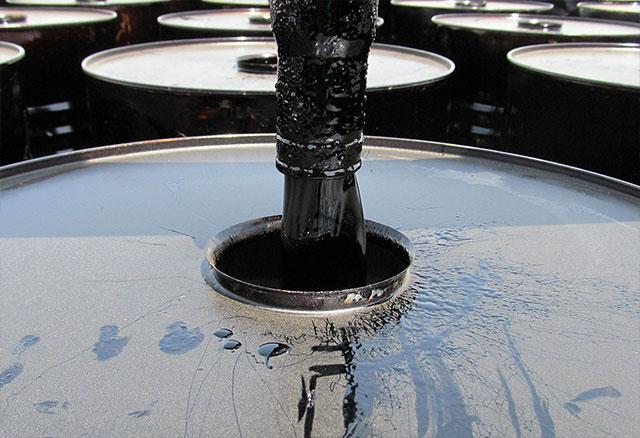Bitumen Application

Bitumen Application
For civil engineering works
- Constructions of roads, runways, and platforms.
- Waterproofing to prevent water seepage.
- Mastic floorings for factories.
- Canal lining to prevent erosion.
- Dump-proof courses for masonry.
- Tank foundation.
- Joint filling material
- Bitumen is widely used in the construction of asphalt roads and bituminous membrane products. Bitumen is commonly used to build highways, motorways and rail networks. Bitumen has excellent water-proofing properties and is widely used for making roofing products along with a range of other household and industrial applications, from emulsion paints to sound-proofing. Penetration Bitumen and Bitumen Emulsions are used for the construction of railway tracks and by using special types of bitumen such as Polymer Modified Bitumen, the vibration and noise levels are reduced due to a dampening effect. Bitumen has been proven to be effective on both high-speed railway tracks and heavy load railway tracks. Bitumen is also used for surfacing airfield runways and airstrips (PMB is preferred due to its fuel resistant properties) and taxiways. For the Marine construction industry bitumen is used for hydraulic applications such as canal lining, underwater tunnels, river bank protection, dam construction, and sea defenses. There are also numerous industrial applications like roofing felt material, printing inks, packaging paper, linoleum, electrical cable / Junction box insulation, mastic for roofing of terraces, and duplex paper manufacture. Bitumen Suppliers Limited can meet all your individual requirements.
Penetration Bitumen Application
Penetration Grade Bitumen is commonly used in road construction, surfacing, and some industrial applications. Additional processing of this type of Bitumen yields various grades of Bitumen products. The Penetration Test determines the hardness of Bitumen by measuring the depth ( in tenths of a mm) to which a standard and loaded needle will vertically penetrate in 5 seconds, a sample of Bitumen maintained at a temperature of 25°C. Hence the softer the bitumen, the greater will be its number of penetration units. We offer the following grades of Penetration Bitumen includingBitumen 80/100, Bitumen 85/100, Bitumen 35/50, Bitumen 40/50, Bitumen 50/70, Bitumen 60/70 and Bitumen 160/220. Equivalent to BS EN12591 and BS EN 13924.
Cutback Bitumen Application
Cutback Bitumen is in liquid form and is Bitumen that is dissolved in a solvent. Typically these solvents include naphtha, gasoline, kerosene and white spirit. Bitumen is cutback by adding controlled amounts of petroleum distillates such as the solvents described above. This reduces the viscosity of the bitumen temporarily so that it can penetrate pavements effectively. This would allow spraying at temperatures that are too cold for successful sprayed sealing with neat bitumen. The materials used to cutback bitumen will evaporate after application leaving the remaining material similar in hardness to the original bitumen. The amount of solvent used determines the viscosity of the Cutback Bitumen and the type of solvent used controls the curing time. The advantages of using Cutback Bitumen over Bitumen emulsions is a much higher residual Bitumen percent, typically over 80% compared with 40% – 65% for Bitumen emulsions. Cutback bitumens are used for road construction and road maintenance applications.
There are two types of Cutbacks, Rapid Curing (RC) and medium Curing (MC)depending on the solvent used. They are further defined by a number which indicates the minimum kinematic viscosity (fluidity) of the Cutback Bitumen. We offer a variety of Rapid Curing Bitumen including RC 30, RC 70, RC 250, RC 800 and RC 3000 which are all used in road construction and treatments of pavement. Our range of Medium Curing Bitumen includes MC 30 containing 50% Bitumen which is commonly used as a Prime Coating, MC 70 which contains 55% Bitumen is used for Prime Coating and Maintenance Mixing andMC 3000which contains 80% Bitumen is used for Surface Dressing and Semi Grouting (Penetration Macadam). The process of priming involves applying a low viscosity binder to a prepared but usually unbound aggregate base. It is intended to be absorbed by the top layers of the base and provide a surface which is more easily wetted by a following bituminous covering. The primer will be able to carry traffic for a short time and manage dust. Most commonly primers are applied at rates between 0.5 L/m² and 1.4 L/m². Cutback bitumen which is suitable for priming is also used for Tack-coating. This is applied to an underlying surface to aid with the adhesion of the following asphalt layer. Most commonly tack coats are applied at rates between 0.2 L/m² and 0.4 L/m². Cutback Bitumen is suitable for primer sealing and can also be used in the manufacture of pre-mixed asphalt, which is used in patch repairs. For an effective priming operation when temperatures are very low or where traffic flow is likely to cause problems to a primed surface before the final seal can be sprayed, a primer seal can be used to protect the pavement for periods between 6 and 12 months. Cutback Bitumen is used extensively in sprayed sealing applications, particularly in cooler weather where they provide improved initial stone retention due to the lower viscosity. Usually, A single application of cutback bitumen is sprayed on the primed pavement onto which aggregate is laid.
Oxidized Bitumen Application
Oxidized Bitumen is produced by either a staggered or a continuous blowing process. The heated Penetration Grade Bitumen under controlled environment is blown with air which controls the oil content in the Bitumen while it is oxidized. The different grades produced for suited applications are distinguished by two numbers to indicate the midpoints of their softening point and penetration ranges. We offer various grades of Blown Bitumen including R10/20, R85/25, R95/25, R85/40, R90/40, R110/30, R90/15 and R115/15.
Blown Grade Bitumen is widely used as an anti-slip layer compound in the piling industry, for the manufacturing of sound dampening felts, for the manufacture of roofing felts, for the manufacture of under carriage sealant in the automobile industry, electric cable joint protection, joint filling compound, sealant compound and a multitude of industrial applications. Fuel oil can be added to the process to increase the penetration if required for custom applications and requirements.
Emulsion Bitumen Application
Bitumen Emulsion is made up of three basic ingredients which include Bitumen, an emulsifying agent and water. Based on the various specifications it may contain other additives such as coating improvers, stabilizers, anti-strips or break control agents. It is a well-known fact that asphalt and water will not mix, except under carefully controlled conditions using highly specialized equipment and chemical additives.

